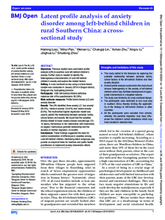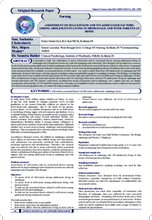Displaying 111 - 120 of 485
This study aims at analyzing adoption-related feelings, which include the feelings of loss and the ensuing curiosity about the birth family and pre-adoption life.
This study investigated the role of childhood parental deprivation in the association between quality of life (QOL) and the Epstein–Barr virus (EBV) antibody titer, a marker of cellular immune functioning, using data from 734 adults living in seven communities in rural Fujian, China.
This study sought to identify the heterogeneous characteristics of rural left-behind children’s anxiety and explore the related factors through a cross-sectional survey using a school-based sample in January 2018 in Qingxin district, Qingyuan city, Guangdong province, China.
A descriptive study was undertaken to assess self-esteem and its associated factors among adolescents living in orphanage and with parents at home in a selected orphanage and community, West Bengal with the objectives to assess level of self-esteem among adolescents living in orphanage and in home and to find out the associated factors related to self-esteem.
Through interviews with cutting edge researchers, scientists, economists, families and educators, this film explores the so called “miracle years”, a critical period of our lives that no one remembers, in a profound new way – emphasizing how the first few years are the greatest opportunity we have to give children the best start in life.
In this article, the authors present findings from a follow‐up assessment from the Bucharest Early Intervention Project (BEIP) - the first longitudinal study to investigate the neurodevelopment of institutionalized infants randomized to a foster care (FCG) intervention versus care as usual (CAUG)- of brain electrical activity as indexed by resting EEG at age 16 years.
This video explores Sugira Muryango: "Families Strengthening Intervention for Early Childhood Development: Alternative Delivery System of Poverty Reduction Strategies" in Rwanda—a project by the Research Program For Children and Adversity at the Boston College School of Social Work led by Salem Professor in Global Practice Theresa Betancourt.
In a sample of 136 Romanian children from the Bucharest Early Intervention Project (BEIP), who were exposed to early psychosocial deprivation in the form of institutional care, the authors of this study examined caregiver-reported and observer-rated signs of disinhibited social engagement disorder (DSED).
This how-to video breaks down serve and return into 5 simple steps (from Filming Interactions to Nurture Development) and features adults and young children doing each step together.
This study examined associations between perceived support from adults in three developmental contexts (home, school and neighbourhood) and mental well-being (life satisfaction, self-concept, optimism) among grade four children living with foster parents in British Columbia (B.C.), Canada.


